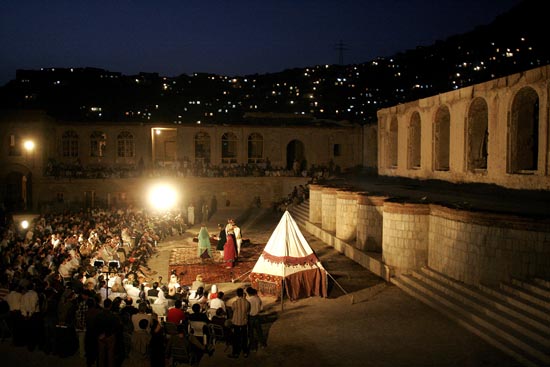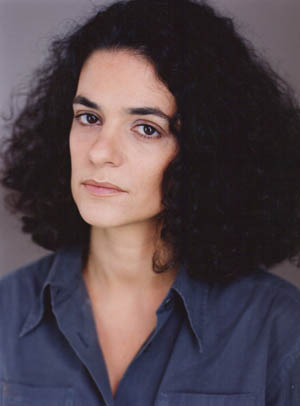Staging Shakespeare in Kabul
University hosts adventurous director Corinne Jaber

When Corinne Jaber decided to stage the Shakespeare comedy Love’s Labour’s Lost in Afghanistan with local actors, she knew it was an ambitious project. The year was 2005; Shakespeare’s plays hadn’t been performed since the Soviets invaded Afghanistan in 1979, and both language and post-Taliban cultural barriers proved nearly insurmountable.
The German-Canadian actress and director, daughter of a Syrian Kurdish father and a German-Hungarian mother, has long felt an artistic pull to Eastern, and particularly Muslim, cultures. Despite many obstacles, Jaber and her Afghanistan production not only triumphed, but traveled to Paris. She went on to direct Fabrice Melquiot’s Sisters in both Kabul and Paris in 2008.
Through March 8, Jaber is giving a series of public lectures at BU about her cross-cultural adventures. She is on campus as part of a residency sponsored by the University’s Humanities Foundation, the Institute for the Study of Muslim Societies and Civilizations, the College of Arts & Sciences English department, and the Women’s Gender and Sexuality Studies Program.
“I’m an actress and a director, but I’m not an academic,” says Jaber. In fact, visiting a college campus to lecture about her experiences is a first for her.
In addition to her stage role in Peter Brook’s The Mahabharata, Jaber has acted with the Royal Shakespeare Company and toured Europe in a bilingual production of Bruce Myers’ A Dybbuk for Two People. In 2001 she was awarded the Moliere Prize—the French equivalent of the Tony—for best actress in Richard Kalinowski’s Beast on the Moon, the story of Armenian genocide survivors who meet for an arranged marriage in Wisconsin.
“I first ran across Corinne Jaber when I saw an Associated Press report on her production of Love’s Labour’s Lost in September 2005,” says William C. Carroll, a CAS professor and chair of English, who had written his dissertation on the early Shakespeare comedy decades before. While working on an essay for an international Shakespeare conference, Carroll says, “it occurred to me to try to contact her, and to my surprise, she responded. In the course of talking with her, I thought, why not have her come to BU if I could secure funding? What I particularly liked was that she could speak to such different audiences, as she will do when here.”
Jaber recently spoke with BU Today from her home in Paris.
BU Today: How does a Shakespeare comedy travel to a heavily traditional culture like Afghanistan’s?
Jaber: Shakespeare is universal, so you can take Shakespeare and do it anywhere, which is amazing after 400 years. This year the Globe Theatre is doing a Shakespeare marathon, with plays performed in 68 languages. We took Love’s Labour’s Lost and transposed it to an Afghan location, but that’s really all we had to do to make it Afghan or different; everything else just fitted in, which was astonishing on every level.

What were the challenges?
The difficulty was not so much Shakespeare and the storytelling; it was more the language because of the education level of the actors. The only translation we had was Persian, which we had translated into Dari. You can compare this to American English versus British English, a lot of little things where the words were different. I cut big chunks of the play we couldn’t do because they were too salty, and there were huge passages that would be incomprehensible to Afghans.
How big a factor was it that this population was unused to seeing plays?
There hadn’t been theater there in so long we couldn’t have gone for two hours. We had the play down to an hour, leaving what was important.
Did you have a clear idea of what you were in for?
It sounds kind of stupid and naïve, but I didn’t know what I was embarking on—it just kind of all happened. I didn’t know how big an undertaking it was until I was in the middle of it. In Afghanistan, when you decide something, none of it works out. But what happens is more interesting than what you have planned. There are big problems for Westerners there. Maybe my kind of unawareness was a plus.
What did you learn about Afghans, particularly the women, that you couldn’t have learned from Western media?
Everything there is surprising, and everything is beyond what you can imagine. Everything I assumed about Afghan women and Afghan society was totally shattered. If you described America by only reporting on the killings, nobody would ever go there. I’m not saying they’re not suffering, that they’re not treated badly or violated, but there’s something else that’s just as true, a whole other life going on that nobody ever talks about. The women I work with are totally marginal; they are mainly actresses, living in Kabul on their own, so they’re in no way the image of the submissive Afghan woman. But I’ve never met a submissive Afghan woman. Afghan women are a hell of a lot more difficult than you’d imagine, and more interesting than what you’ve heard in the news.
What do you think of women having to wear burkas?
Some people love the burka and say it’s great; you haven’t washed your hair and you put the burka on or you wear it if you don’t want to be recognized. It’s much, much more complicated than Westerners assume. I’m no defender of the burka, but the issue is more complex; it’s not just black and white. The real problem of equality is the problem of men and women not knowing each other. In Kabul there’s no space where men and women can meet; you can go to restaurants where there are family sections, but if you’re not related, everything is separate. People don’t have friends; in all these traditional societies you have family, not friends. So apart from your cousins, you don’t know any girls or boys. They don’t know how to actually deal with each other. Men seem to have no clue what women are about, though women seemed to know what love is, what sex is. This was apparent many times in Love’s Labour’s Lost, because the whole play is about love.
Were the audiences mixed?
The audience was mostly men. But the actresses were uncovered. And there was no touching on stage.
Are you eager to go back to Afghanistan?
I totally fell in love with it. I miss it. It’s an incredibly beautiful country. The amazing thing is when you arrive, they look at you and they take you in. They really do know who you are.
Corinne Jaber will deliver three lectures: Sisters and the Status of Women in Afghanistan, on Wednesday, March 2, at 4 p.m., at the Kenmore Classroom Building, 565 Commonwealth Ave., Room 107; Love’s Labour’s Lost in Afghanistan, on Thursday, March 3, at 6 p.m. at CAS Room 200, 725 Commonwealth Ave.; and Negotiating the Arts in Afghanistan, on Tuesday, March 8, at 4 p.m., at the George Sherman Union Terrace Lounge, 775 Commonwealth Ave. The lectures are free and open to the public. More information can be found here.
Susan Seligson can be reached at sueselig@bu.edu.
Comments & Discussion
Boston University moderates comments to facilitate an informed, substantive, civil conversation. Abusive, profane, self-promotional, misleading, incoherent or off-topic comments will be rejected. Moderators are staffed during regular business hours (EST) and can only accept comments written in English. Statistics or facts must include a citation or a link to the citation.